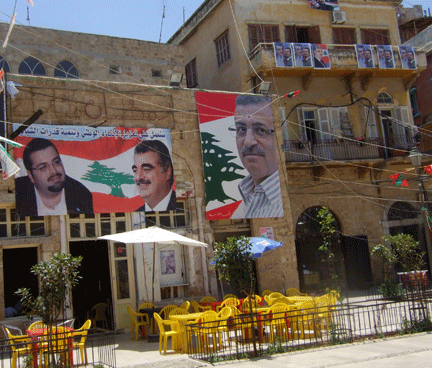
Political posters in a major square in the old city of Saida, the birthplace of former Prime Minister Rafiq Hariri.
Hariri Lives on in Lebanon
The recent election in Lebanon on June 7 was a surprise for Hezbollah and General Michel Aoun. A number of pundits thought this unlikely alliance would come to power and set Lebanon on a new and dangerous path. But, after all, this is Lebanon, one of the most unlikely spots for a conservative Islamic takeover anywhere in the Middle East. No doubt underestimated as a shadow of his famous father, Saad Hariri led his March 14 coalition to victory, actually gaining a seat in Parliament. The United States, Saudi Arabia and Israel are no doubt pleased that Hezbollah was denied bragging rights. Iran and Syria presumably are not.
Lebanon is a functioning democracy, although of a somewhat odd type. Given its historical trajectory after World War I, the government is intentionally split on a sectarian basis. Based on the 1932 census, Christians enjoyed a 6/5 advantage in Parliament until 1990, when the ratio was equalized. By law the President must be a Maronite Christian, the Prime Minister a Sunni Muslim and the Speaker of Parliament a Shi’a Muslim. The March 14 coalition now has a majority of 71 votes, while the March 8 coalition has only 57. The winning coalition includes the Future Party of the Sunnis, led by Saad Hariri, the Progressive Socialists of the Druze, the Lebanese Forces of the Maronites and the Phalange of the Maronites. The opposition includes Hezbollah and Amal, both Shi’a groups, as well as the Free Patriotic Movement of Maronite Michel Aoun. Although the March 8 alliance actually won the popular vote by about 100,000 votes, seats in Parliament are weighted, which explains why the March 14 group can claim victory. It is expected that when the new government is formed on June 21, the new Prime Minister will be Saad Hariri.
I was visiting Beirut prior to and just after the election. While there were a few shooting incidents, especially in Jbail (the modern town where Byblos stood), the election went fairly smoothly. Some 50,000 Lebanese troops added a public face to the security arrangements. So did the advertising. Along the main highways the billboards were plastered with political ads, usually large mug shots of the politicians. Sometimes the whole side of a building was engulfed with a draping of one of the candidates. Two days after the election, as I came back to Beirut from Syria, most of the smiling faces were still up, even if not all of the people running were smiling at the results.
So how did the March 14 coalition do it? First, there was a large voter turnout, at least large for Lebanon, perhaps as much as 54% of the 3.2 eligible voters. Turnout was especially high in Sunni areas. Second, an influx of some 100,000 expatriate Lebanese voters probably led to a significant advantage for the March 14 coalition. But perhaps the major reason was the arrogance of Hezbollah. Riding the wave of popular support for having fended off the Israeli invasion in 2006, the subsequent power play in the Sunni suburbs of Beirut in 2008 left a bitter taste in the mouths (and voting fingers) of the March 14 sympathizers. Concerned that a Hezbollah victory would only encourage more Israeli retaliation, many Lebanese may have voted against Hezbollah and Aoun more than for the Hariri name.
The future of Lebanon does not seem destined for Hezbollah, which owes its existence and popularity to Israel and not for devotion to a multicultural Lebanese society. Because its militia commands the south of Lebanon, it is actually an obstacle to peace. No country can thrive when militias outman the army, a lesson Lebanon has learned the hard way. The recent opportunistic assault on Sunni areas in Beirut resulted in an unfair veto option for Hezbollah, brokered in the Doha Agreement. This guarantees a stalemate and discourages foreign investment. Unraveling the tentacles of Hezbollah on the national scene will be the greatest challenge for Hariri. Few Lebanese have the stomach for a return to the sectarian violence of the disastrous civil war, the scars of which are still sketched on walls in Ras Beirut. The downtown area has been rebuilt and tourism is increasing, at least in areas where Hezbollah is not patrolling. God only knows what the future holds, but there are so many gods haunting this ancient land that it may take awhile to figure out which one really cares for Lebanon, zay ma hiya, as the saying goes.
Daniel Martin Varisco